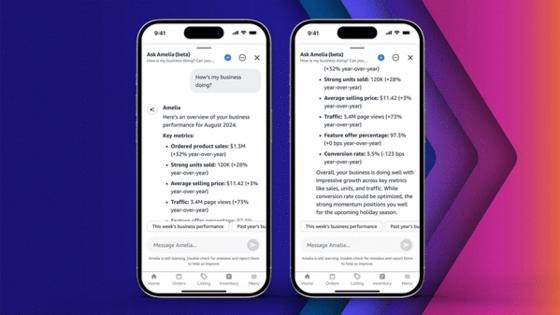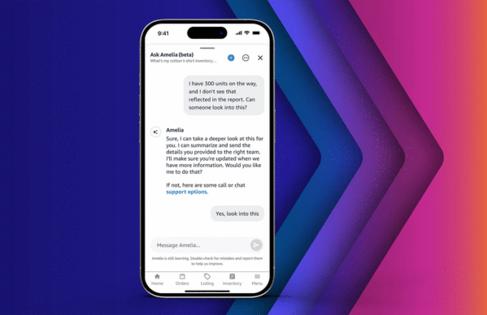Amazon launches Project Amelia, an AI assistant for third-party sellers
Published in Business News
Amazon launched a new AI-powered personal assistant for third-party vendors Thursday, one of many new features the company rolled out for its independent sellers this week.
The assistant, internally called Project Amelia, answers questions for sellers, offers advice and, down the line, will diagnose problems and take action.
Amazon has already integrated generative artificial intelligence into some services for sellers, like the ability to use AI to write suggested product listings, and has launched other AI-powered tools, including the shopping assistant Rufus and the chatbot Q. It is also reportedly working on an upgrade to its personal voice assistant Alexa, using AI to power a new, paid subscription service.
Project Amelia will run on Amazon Bedrock, an Amazon Web Services offering that provides different foundational learning models for companies, including Amazon itself, to build and scale AI-powered applications.
Amazon has been working on Project Amelia for more than a year, Dharmesh Mehta, vice president for selling partner services, said in an interview Wednesday with The Seattle Times. The project got its name because it was housed in the company’s Amelia building in South Lake Union. That building was named in honor of Amelia Earhart.
In its beta version, launched Thursday, Project Amelia is able to answer questions about a seller’s inventory, sales and customer traffic, as well as offer advice about how to launch a new product or prepare for the upcoming holiday season. It may recommend that a seller add more keywords to a product listing or promote festive items before the holiday.
It may also prompt a seller to try Amazon’s other services, like Fulfillment by Amazon, a service that third-party sellers can sign up for to use Amazon’s fulfillment network to ship orders.
Right now, Project Amelia looks and acts like other chatbots on the internet — a user types a question in a text box at the bottom of the screen and sends it over to Amelia, which takes its time thinking about the response and then generates a few lines of information. The bot then suggests follow-up questions the user may want to ask next.
But, Mehta imagines an iteration of Project Amelia that doesn’t require as much back and forth. He hopes the assistant could one day offer to take action for the seller. Rather than talking with a seller about the upcoming holidays, he pictures Project Amelia one day offering to set up a 20% discount on festive T-shirts before the holidays.
“We’re leveraging generative AI throughout the shopping experience, and if we can create a better shopping experience, then customers love the products, they come more often, that’s all good for sellers,” Mehta said.
“We’ll keep innovating on the shopping experience [and] if I think about every part of the selling experience, we can continue to reinvent some of those or transform them with generative AI,” he continued.
Mehta compared Project Amelia’s beta version to a concierge service. The assistant takes in all sorts of user questions and then works behind the scenes to find an answer.
Sometimes the concierge has to call in a plumber or an electrician to make the fix, but the user doesn’t have to know that. In the AI world, the plumbers and electricians are other data models trained to be subject-matter experts on all sorts of topics.
In the last three months, Amazon has seen a surge in interest in its AI tools that help sellers write product listings, Mehta said. After launching last year, the company has continued to refine the capabilities and, as more sellers use them, the AI gets smarter, he said.
At first, sellers had to input keywords. Then, they could add images or send a URL. Soon, Mehta said, sellers can upload a product catalog and the tool will do the rest. And, Amazon plans to launch a new feature that will use AI to generate advertising videos for sellers.
This week, at Amazon’s annual conference for third-party sellers, Amazon announced a range of other new services — like new capabilities to ship products from overseas, a new app for those sellers who use Amazon Shipping and a new offering to automatically replenish products for third-party sellers when inventory runs low.
Amazon also announced new partnerships with three other major players in the e-commerce space: Google, TikTok and PayPal.
Third-party sellers who use Buy With Prime — a way for customers to shop using Amazon Prime on third-party websites — can now display the Prime check mark and estimated delivery speeds on TikTok and Google’s shopping platforms.
On PayPal, merchants can now offer Prime as a delivery option for shoppers.
©2024 The Seattle Times. Visit seattletimes.com. Distributed by Tribune Content Agency, LLC.















Comments